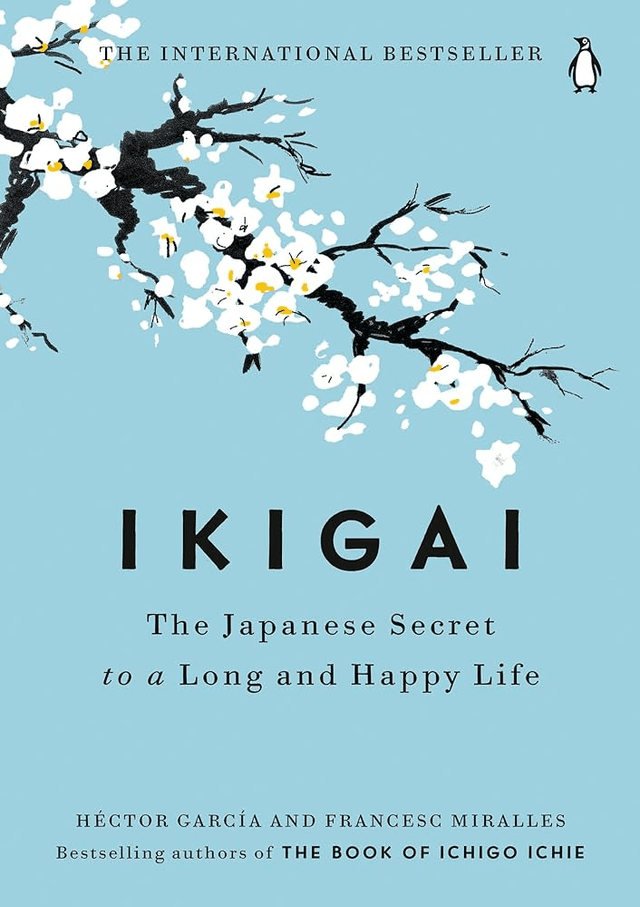Ikigai: The Japanese Secret to a Long and Happy Life vs. Sapiens: A Brief History of Humankind by Yuval Noah Harari
Ikigai: The Japanese Secret to a Long and Happy Life
Discover the secrets to a long, healthy, and fulfilling life with "Ikigai: The Japanese Secret to a Long and Happy Life" by Héctor García and Francesc Miralles. This insightful book delves into the Japanese concept of ikigai, or a "reason for being," which is believed to be a key factor in the remarkable longevity of the residents of Okinawa, a Japanese village known for having the world’s highest percentage of centenarians. Through interviews with these vibrant centenarians, the authors uncover how the principles of ikigai—where passion, mission, vocation, and profession intersect—contribute to their happiness and longevity. The book reveals the residents' daily practices, from their nutrient-rich diets and active lifestyles to their strong community bonds and purposeful work. "Ikigai" provides practical advice and tools to help readers discover their own ikigai, offering a blend of cultural wisdom and actionable steps towards a life filled with purpose, health, and joy. This bo...
Sapiens: A Brief History of Humankind by Yuval Noah Harari
The great thing about this book is that it takes a big-picture view of human history. It attempts to explain the main themes of human history without getting bogged down in the details. Sapiens also debunks many popular myths about human history, including the one that people today live happier lives and have better diets than our hunter-gatherer predecessors. It comes with an epilogue about the future of humankind in light of ever-accelerating technological progress. With the recent advances in AI it is more relevant than ever. If you're going to read one book on history this year, read this one.


Reviews
Reviews
| Item | Votes | Upvote |
|---|---|---|
| Engaging and accessible writing style | 1 | |
| Motivating and thought-provoking | 1 | |
| Provides actionable advice on living a healthier life | 1 |
| Item | Votes | Upvote |
|---|---|---|
| A lack of cited sources and references to back up claims | 1 | |
| Certain concepts and advice may seem repetitive | 1 | |
| Sometimes unfocused and strays from the main theme | 1 |
| Item | Votes | Upvote |
|---|---|---|
| No pros yet, would you like to add one? | ||
| Item | Votes | Upvote |
|---|---|---|
| No cons yet, would you like to add one? | ||
Frequently Asked Questions
'Ikigai' focuses on practical advice for enhancing well-being and finding purpose in life, making it a strong choice for personal development. It provides actionable steps and insights into living a healthier and more fulfilling life. In contrast, 'Sapiens' offers a broad historical perspective and challenges common beliefs about happiness and lifestyle, which may not directly contribute to personal development but can provide valuable context for understanding human behavior. If you're looking for direct personal growth strategies, 'Ikigai' may be the better option.
'Ikigai' is specifically designed to provide actionable advice on living a healthier and more purposeful life, making it the better choice for readers seeking practical steps. 'Sapiens', while insightful and thought-provoking, primarily focuses on historical analysis and does not offer the same level of actionable guidance for personal improvement.
'Ikigai' emphasizes finding personal purpose as a pathway to happiness, drawing from the experiences of centenarians in Okinawa. It provides a framework for readers to explore their own ikigai. On the other hand, 'Sapiens' challenges the notion of modern happiness by comparing it to the lives of hunter-gatherers, suggesting that contemporary life may not be as fulfilling as often believed. Thus, while both books discuss happiness, they approach it from different angles—one from a personal development perspective and the other from a historical and philosophical viewpoint.
'Ikigai: The Japanese Secret to a Long and Happy Life' by Héctor García and Francesc Miralles explores the Japanese concept of ikigai, or 'reason for being.' The book examines how this principle contributes to the remarkable longevity and happiness of the residents of Okinawa, a Japanese village known for its high percentage of centenarians. Through interviews with these centenarians, the authors reveal how practices such as nutrient-rich diets, active lifestyles, strong community bonds, and purposeful work contribute to their well-being. The book offers practical advice and tools to help readers discover their own ikigai and enhance their lives.
Pros of 'Ikigai: The Japanese Secret to a Long and Happy Life' include its engaging and accessible writing style, its motivating and thought-provoking content, and the actionable advice it provides on living a healthier life. However, some cons include a lack of cited sources and references to back up claims, certain concepts and advice that may seem repetitive, and moments where the book sometimes feels unfocused and strays from the main theme.
'Ikigai: The Japanese Secret to a Long and Happy Life' is written by Héctor García and Francesc Miralles. Héctor García is a Spanish author who has lived in Japan for many years and writes about Japanese culture. Francesc Miralles is a Spanish author and journalist specializing in psychology and spirituality.
'Ikigai: The Japanese Secret to a Long and Happy Life' offers practical advice and tools to help readers discover their own ikigai. This includes guidance on aligning passion, mission, vocation, and profession to find deeper satisfaction in everyday life. The book also shares insights into maintaining a nutrient-rich diet, leading an active lifestyle, fostering strong community bonds, and engaging in purposeful work.
'Sapiens: A Brief History of Humankind' by Yuval Noah Harari takes a big-picture view of human history. It explains the main themes of human evolution and development without getting bogged down in details. The book also debunks many popular myths about human history, such as the idea that people today live happier lives or have better diets than our hunter-gatherer predecessors. It ends with an epilogue discussing the future of humankind in light of accelerating technological progress, making it particularly relevant given recent advances in AI.
'Sapiens: A Brief History of Humankind' discusses several main themes, including the cognitive revolution, the agricultural revolution, the unification of humankind, and the scientific revolution. The book explores how these events have shaped human societies, cultures, and economies. It also delves into the impact of technological advancements on the future of humanity.
Yuval Noah Harari is an Israeli historian and professor in the Department of History at the Hebrew University of Jerusalem. He is known for his bestselling books 'Sapiens: A Brief History of Humankind', 'Homo Deus: A Brief History of Tomorrow', and '21 Lessons for the 21st Century'. Harari's work focuses on broad historical processes and their implications for the future.
Pros of 'Sapiens: A Brief History of Humankind' include its broad, comprehensive view of human history and its ability to debunk popular myths. The book is also praised for its engaging writing style and thought-provoking insights. Cons might include its broad scope, which can sometimes lead to oversimplification of complex historical events, and the fact that some readers may find its speculative future predictions less convincing.



















